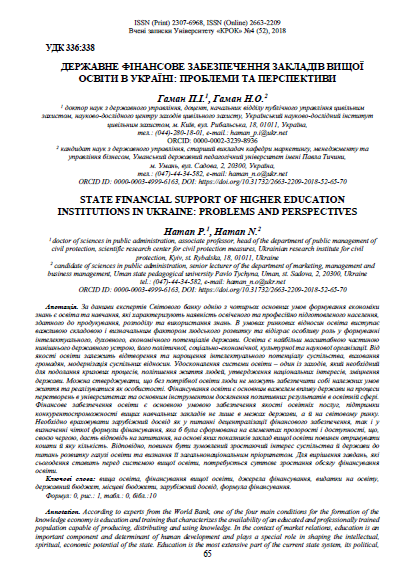STATE FINANCIAL SUPPORT OF HIGHER EDUCATION INSTITUTIONS IN UKRAINE: PROBLEMS AND PERSPECTIVES
DOI:
https://doi.org/10.31732/2663-2209-2018-52-65-70Keywords:
higher education, higher education financing, funding, expenditure on education, state budget, local budgets, foreign experience, financing formulaAbstract
According to experts from the World Bank, one of the four main conditions for the formation of the knowledge economy is education and training that characterizes the availability of an educated and professionally trained population capable of producing, distributing and using knowledge. In the context of market relations, education is an important component and determinant of human development and plays a special role in shaping the intellectual, spiritual, economic potential of the state. Education is the most extensive part of the current state system, its political, socio-economic, cultural and scientific organization. The quality of education depends on the reproduction and growth of the intellectual potential of society, education of citizens, modernization of social relations. Improving the education system is one of the measures necessary to overcome the crisis processes, improve people's lives, establish national interests, and strengthen the state. It can be argued that without the necessary education people can not provide themselves with proper living conditions and be realized as individuals. Education financing is a major lever of state influence on the processes of transformation in universities and the main instrument for achieving positive results in the educational sphere. Financial provision of education is a basic condition for ensuring the quality of educational services, supporting the competitiveness of higher education institutions not only within the state but also on the world market. Foreign experience should be taken into account both in the issue of decentralization of financial security and in the definition of a clear funding formula that would be formed on the elements of transparency and accessibility, which, in turn, will answer the question, on the basis of which indicators higher education institution should receive funds and what quantity Accordingly, the growing interest of society and the state in the issues of the development of the education sector and its recognition as a nationwide priority must be due. In order to solve the problems that the present poses to the system of higher education, a substantial increase in the financing of education is required.
Downloads
References
Бойко А. Конкурентоспроможність освіти як показник її ефективності та якості. Вища освіта України : журнал. 2008. № 3. С. 16–23.
Вакарчук І. О. Вища освіта України – європейський вимір: стан, проблеми, перспективи. Вища школа : журнал. 2008. № 3. C. 3–19.
Паращенко Л. І. Управління загальною середньою освітою на засадах м’якої системної методології П. Чекланда. Вчені записки Університету «КРОК» : зб. наук. праць. Київ : Вид-во ВНЗ «Університет економіки та права «КРОК» №3 (51), 134-142.
Стельмах О. Особливості франчайзингу та індаументу в системі фінансування вищих навчальних закладів. Вісник Тернопільської Академії народного господарства : журнал. 2003. № 5. С. 82–87.
Тарасенко І. О., Нефедова Т. М. Проблеми фінансування вищої освіти в Україні в контексті забезпечення конуцрентоспроможності. Вісник КНУТД : журнал. 2013. № 4. С.177-185.
Волкова Н. Ф. Ефективність використання коштів ВНЗ. Фінанси України : журнал. 2005. № 5. C. 66–72.
Офіційний сайт Державної служби статистики України. URL: http://www.ukrstat.gov.ua/.
Про вищу освіту : Закон України вiд 17.01.2002 № 2984-III. Київ: Верховна Рада України. URL: http://zakon.rada.gov.ua/cgi-bin/laws/main.cgi?nreg=2984-14.
Федулова Л. Концептуальна модель інноваційної стратегії України. Економіка і прогнозування : журнал. 2012. № 1 . С. 87–100.
Яшкіна О. І. Інноваційна діяльність підприємств України : тенденції розвитку та чинники впливу. Маркетинг і менеджмент інновацій : журнал. 2013.№4. С. 181–189.


